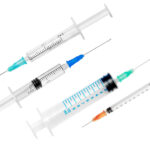Associate Professor Peter Wong discusses exciting research on preventing adverse pregnancy outcomes in APS, covid prevention and the new ACR vaccination guidelines.
We asked four leading Australian rheumatologists to talk us through research presented at ACR 2022 that excites them and promises interesting changes for the future.
In this article, Associate Professor Peter Wong discusses his top covid and infection prevention picks, and very promising developments in preventing adverse pregnancy outcomes in women with anti-phospholipid antibody syndrome (APS).
The latest ACR vaccination guidelines will be published in the next couple of months. In the meantime, Professor Wong highlighted some of the most important changes, starting with the live attenuated rotavirus vaccine in infants of mothers taking DMARDs.
“They are a bit less worried if women have been exposed to a biologic in the second and third trimester, but still a little bit worried in the sense that it obviously traverses the placenta into the newborn,” the Sydney rheumatologist said.
If the mother has been exposed to rituximab in the second or third trimester, delaying the rotavirus vaccine until at least six months of age is recommended. However, if the mother has taken TNF inhibitors in the second or third trimester, the infant can have it within the first six months (conditionally recommended).
“I must confess I was a bit surprised about that because my understanding is that the TNF inhibitor can hang around for quite some months, passing from mum to newborn, and hang around in the neonatal circulation for some time,” he said.
“So I think this one is an interesting recommendation which we perhaps should just have a think about before we start implementing here in Australia.”
Influenza vaccine recommendations have also changed. The guidelines recommend people aged 18-65 who are immunocompromised get the high dose or adjuvanted vaccine, rather than the standard dose.
“GPs keep these lying around in their fridges, which is very helpful. But the bottom line was very pragmatic: if the high dose or adjuvanted is not available, then just give any flu vaccine.
“If you’re going to give it in the context of rituximab, probably delay the rituximab for at least two weeks after the influenza vaccination.”
Herpes zoster vaccination is recommended for immunocompromised people over 18, and to the general public over 50.
“The talk was very much about Shingrix – Zostavax isn’t on the radar in America. Obviously that’s a problem here in Australia, because it’s not available on the PBS. It’s only available by private script at cost to the customer of about $250 or thereabouts a pop, so it’s about $500 for the course of two.”
The guidelines also strongly recommend pneumococcal vaccine in RMD patients on immunosuppressive medications, “which made me think I probably should be doing a bit more to make sure my patients get it,” said Professor Wong.
Professor Wong next focussed on covid therapies and rheumatic disease, starting with pre-exposure prophylaxis with Evusheld, which he’s been using for his patients on rituximab. Data presented from the Cleveland Clinic suggested that the risk of infection was low in these patients, and if they did get covid it would be fairly mild.
“But the problem is that it doesn’t cover all the emerging variants. At the moment, it’s reasonable to use, but it may well not be so useful with the way that the variants are changing.”
Poster 0791, presented by Dr Ingrid Jyssum of the University of Oslo, compared patients given three doses of a covid vaccine with a healthy population who’d had two doses and found the immunogenicity was similar.
“So I think our patients need that extra dose,” said Professor Wong.
“And I must say I’ve been a bit lax in not pushing for them to get the fourth dose. And I probably should be recommending they get at least the fourth dose, if not the fifth dose, rather than just sticking with three doses. So that would certainly be something that would change my practice.”
Poster 0785 from the same research group reported that people who had four doses of Pfizer, or four doses of Moderna, had an inferior post-vaccination serologic response to those who’d had three doses of a vaccine plus a dose of covid.
“So a dose of covid, if it’s not too bad, is actually better than having a fourth shot. This is something which I found quite encouraging because I’ve had four vaccine doses and a dose of covid recently coming back from the US.”
Finally, Professor Wong talked about a presentation from Dr Jane Salmon, a physician scientist from New York, on anti-phospholipid antibody syndrome.
“I went into this thinking it was about thrombosis and inflammation and it wasn’t about that at all, for which I’m actually really grateful,” said Professor Wong.
Dr Salmon’s lab has been working on pregnancy issues in APS patients. One of their studies involved taking antibodies from someone with APS and injecting them into a mouse. Many of the babies died in utero, which was consistent with the high rates of fetal growth restriction, preeclampsia and fetal death in humans. But they found that TNF blockade rescues the pregnancies and normalises placental development in this mouse.
The study they’re now doing is an open label study (IMPACT – IMprove Pregnancy in APS with Certolizumab Therapy) in high-risk pregnancies in women with clinical APS (with or without SLE) and lupus anticoagulant.
It’s investigating whether a TNF blockade added to the heparin and low dose aspirin standard of care might reduce the rate of fetal death and preterm delivery due to preeclampsia and/or placental insufficiency.
The study was powered for 50 subjects, and they have 42 to date. Only 21% have had an adverse pregnancy outcome so far, compared with the expected 44%, and almost all offspring (92% versus 69% expected) have survived to hospital discharge.
“She talked about some of the women who are enrolled in study, one of whom had a death at 28 weeks, three or four had recurrent miscarriages – all the ones that sit in your waiting room and your heart just sinks when you see these sorts of patients. And they’re coming from all over the US to be part of the study.
“The study isn’t finished, but I think it’s very promising,” said Professor Wong.
Associate Professor Peter Wong is senior staff specialist and head of the rheumatology department at Westmead Hospital, Sydney. He is also the medical director and chair of the Healthy Bones Australia medical & scientific advisory committee.
Rheumatology Republic invited Professor Ranjeny Thomas, Associate Professor Alberta Hoi, Associate Professor Peter Wong and Professor Peter Nash to present three of their favourite ACR 2022 abstracts in a webinar held at the conclusion of the conference.
Read Professor Thomas’s take on RA research here and Associate Professor Alberta Hoi’s lupus picks here. Professor Nash’s psoriatic arthritis and spondyloarthritis highlights will feature next week.
You can see a recording of the full webinar here, with in-depth discussion and informative slides.





